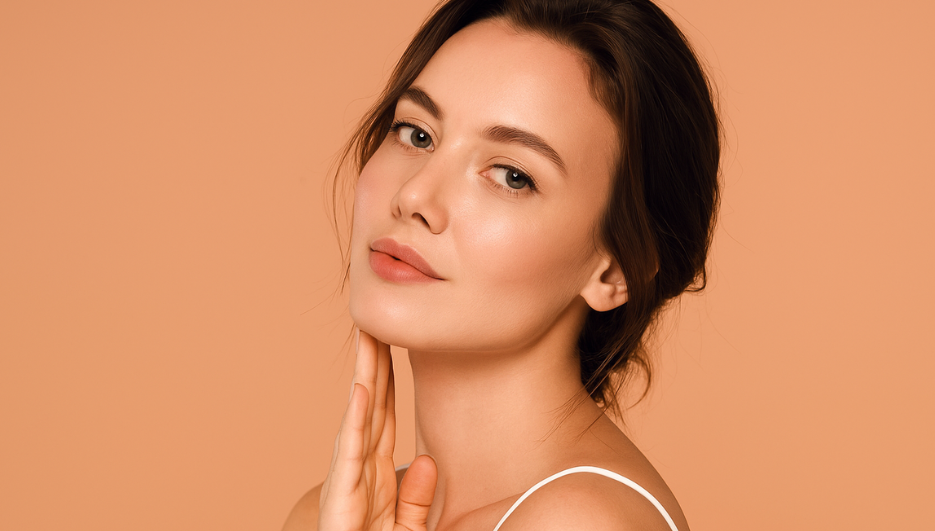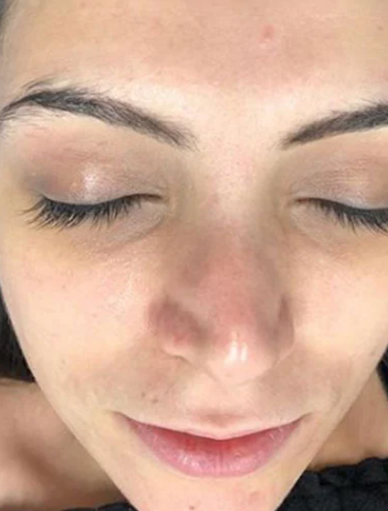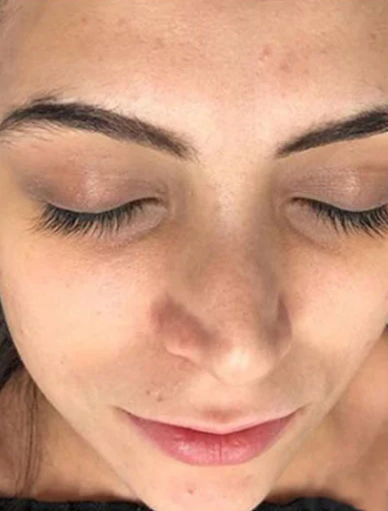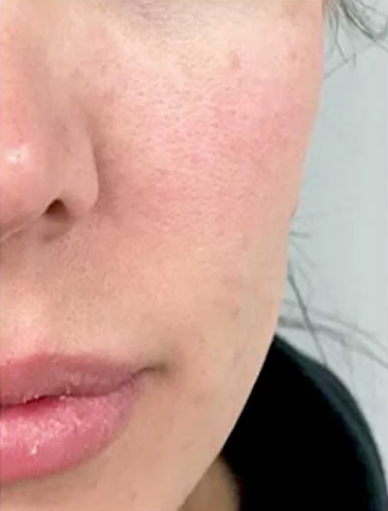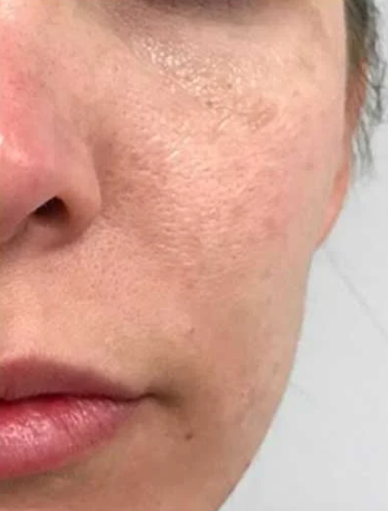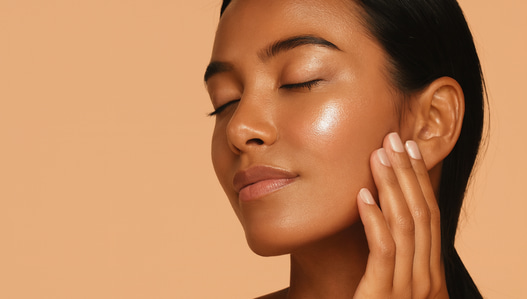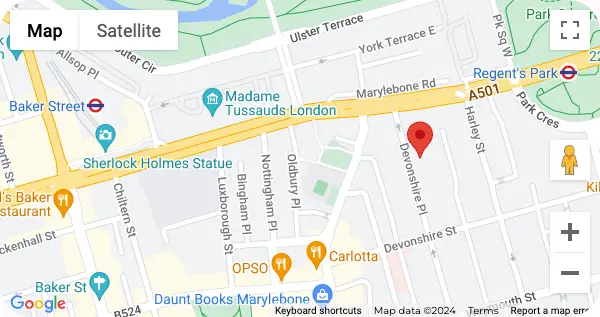At a Glance: Hydrafacial & Rosacea
- Hydrafacial is suitable for mild rosacea (erythematotelangiectatic or papulopustular) as long as it is with your healthcare provider’s guidance.
- It gives gentle cleansing, exfoliation, and hydration to calm irritated skin.
- Can make your skin look and feel better right after treatment, with continuous improvement.
- Not recommended for people with severe or vascular rosacea with visible veins or during flare-ups.
What is Rosacea
Rosacea is a chronic inflammatory skin condition that affects millions of people worldwide – especially those with fair, sensitive complexions. It typically appears on the cheeks, nose, forehead, and chin, causing persistent redness, flushing, and sometimes visible blood vessels or acne-like bumps.
If you are 30 years old and above, you can be prone to having rosacea. You may experience a range of symptoms that may flare-up and then subside over time. You can manage them with appropriate treatments and lifestyle adjustments.
Common Symptoms are:
- Facial redness: Your face has persistent redness that looks like blush or sunburn.
- Visible blood vessels: Small veins under your skin become more noticeable, especially around your nose or cheeks.
- Bumps and pimples: You have red, or pus-filled spots that looks like an acne.
- Burning sensation: Your skin feels warmth, tender, or sensitive when touched.
- Eye problem: Some people develop ocular rosacea, which makes their eyes dry, irritated, and swollen.
The main subtypes include:
- Erythematotelangiectatic Rosacea (ETR): It causes persistent redness, flushing, and small visible blood vessels on the person’s skin.
- Papulopustular Rosacea: Because of its red bumps and pus-filled spots, it’s often mistaken for acne.
- Ocular Rosacea: It usually affects the eyes, leading to dryness, irritation, and swelling of the eyelids.
The exact cause of having these conditions is unknown, but genetic, vascular, and environmental factors play a role in triggering flare-ups.
Common Symptoms & Triggers
Rosacea symptoms can be different from one person to another. They may include the following:
- The skin has persistent redness or flushing.
- Blood vessels are visible (telangiectasia).
- Skin is stinging or sensitive.
- There are visible bumps or pustules.
- The eyes are irritated.
People with rosacea should avoid sun exposure, stress, spicy foods, alcohol, extreme temperatures, and harsh skincare products. These factors can trigger the symptoms; managing them is the key to maintaining skin stability.
What is Hydrafacial?
Hydrafacial is one of the favourite skin treatments of most people in the UK. It deeply cleanses, exfoliates, extracts impurities, and delivers hydrating serums to the skin all in one go. The treatment is non-invasive, and uses a patented Vortex-Fusion Technology that creates a gentle suction effect while infusing active serums into your skin.
The Hydrafacial procedure Explained
A standard hydrafacial includes:
- Detoxification: It helps drain fluids and boost the blood flow of your skin for a healthy glow.
- Cleansing & Exfoliation: Uses a mild acid solution (like glycolic or lactic acid) to remove dead skin cells, making your skin smooth and brighter.
- Extraction: It clears out your clogged pores and blackheads using a gentle suction.
- Hydration & Nourishment: Delivers a mix of antioxidants, peptides, and hyaluronic acid to deeply hydrate and refresh your skin.
- LED Therapy (optional): It uses red or blue light to help calm redness and support healing.
Each step works together to keep your skin hydrated, soothed, and glowing – without the harshness often found in traditional facials or chemical peels.
Why It’s gentle enough for Sensitive Skin
Hydrafacial is different from harsh scrubs or strong chemical peels because it focuses on hydrating the patient’s skin and not to irritate it. Using a gentle suction, it cleanses the pores without damaging the tiny blood vessels, restores moisture and strengthens your skin’s natural barrier with the application of nourishing serums.
Can You Get a Hydrafacial with Rosacea?
Safety Considerations
Hydrafacial can be suited for everyone, even those who have rosacea, but with important precautions. You can benefit from the treatment if you are dealing with mild forms of rosacea, particularly if your skin is dry, dull, or red. However you should not get it if:
- You’re experiencing active flare-ups
- With visible broken capillaries (telangiectasias)
- You have severe papulopustular or vascular rosacea
This makes your skin too fragile, which can’t handle even the gentle exfoliation. You should consult your doctor first before getting the treatment.
Effective & professional doctor-led HydraFacial & Rosacea at our central London clinic
Verified Before & After
Verified Before & After
Who Is a Good Candidate?
If you are looking for a non-invasive treatment with no downtime that can improve the appearance of your skin, hydrafacial is good for you. It is suitable for all skin types and tones, including those with sensitive skin. It can effectively treat your skin problems such as acne, wrinkles, brown spots, oily skin, and enlarged pores.
So, get a hydrafacial if you want to refresh and renew your skin without using lasers, chemical peels, or surgeries.
However, you need to consult your doctor first if you have severe inflammation, pustules, or visible blood vessels.
Effectiveness of Hydrafacial for Rosacea
Patients with rosacea who undergo Hydrafacial treatment notice that the redness of their skin has been reduced and the texture becomes smooth. The tightness and flakiness have been reduced, making their skin feel hydrated and balanced.
- It can reduce redness and blotchiness
- Improved hydration and barrier function
- Smoother surface and refined pores
- Brighter, more even skin tone
Most clients report that after a series of monthly treatments, the results become more noticeable. Their skin is more hydrated and inflammation has subsided.
But the results may depend on types of rosacea you have, your selected products, and your skincare habits.
Complementary Natural Remedies for Rosacea
Getting a hydrafacial can greatly help treat your skin issues, but if you combine it with natural, barrier-supportive skincare, it can enhance your result and long-term comfort.
Gentle ingredients to suit your rosacea:
- Azelaic acid: It can help reduce redness and bacteria on your skin.
- Niacinamide: Strengthens your skin barrier and calms inflammation.
- Ceramides: Repair and protect your skin’s lipid layer.
- Hydrosols: Products with cornflower or chamomile can cool and refresh your skin.
Ingredients you need to avoid:
- Alcohol or menthol
- Fragrance and essential oils
- Strong vitamin C or exfoliating acids
- Abrasive scrubs
To ensure your skin stays calm after a hydrafacial, choose fragrance free and non-comedogenic products.
Best Skincare Practices for Sensitive & Rosacea
After your Hydrafacial treatment, you need to still take good care of your sensitive, rosacea prone skin. The right products and routine can help maintain your results and prevent flare-ups. If you avoid common irritants and choose gentle, nourishing products, your skin can maintain its calmness, hydration, and glow, in between sessions.
If you paired your hydrafacial with a gentle daily routine, the results can last longer.
- Cleanse: Avoid using coconut oil based cleansers because it can clog your pores, instead use an alcohol-free and fragrance-free one.
- Hydrate: Apply serums with hyaluronic acid, peptides, and antioxidants to support your skin’s healing.
- Protect: Sun exposure can trigger rosacea, use sunscreen with SPF 30+ daily to protect your skin.
- Patch test: If you are using a new product, introduce them slowly to prevent irritation.
- Avoid triggers: Skin hot environments (saunas, hot showers, and intense workouts) after your Hydrafacial treatment.
The key to keep your skin’s redness under control after a hydrafacial is consistent skincare routine.
Should You Consider Hydrafacial for Rosacea?
If you have a mild rosacea, Hydrafacial can be a gentle, non-invasive treatment for you, most especially if you are experiencing dryness, dullness, or light redness. It lightly exfoliates your skin and hydrates deeply to look fresher and more radiant after one session.
However, you need to remember that Rosacea can’t be treated with hydrafacial. For best cure on your active flare-ups and or visible blood vessels, consult your dermatologist first to calm your skin’s inflammation. Hydrafacial works best as part of your ongoing skincare routine and should be guided by professionals.
Conclusion
Hydrafacial offers a modern, gentle way to care for sensitive or rosacea prone skin like you. When done properly, it calms redness, restores comfort, and brings back the healthy glow of your skin – without upsetting your skin’s natural balance.
Before you start, it’s always a good idea to consult a skin expert or your dermatologist to check if you are suited to have hydrafacials. So if you have sensitive or rosacea prone skin, it can make it look smooth, hydrated and radiant if you get regular treatments, soothing skincare, and right professional advice.
FAQS
- Is Hydrafacial safe for rosacea?
Yes, it can be safe if you have mild rosacea. But you need to avoid the treatment if you have active flare-ups or broken capillaries.
- How often should someone with rosacea do Hydrafacial?
If you are a starter, you can have hydrafacial once a month, then every 6-8 weeks for maintenance. But it depends on how your skin reacts with it as well as your doctor’s advice.
- Can hydrafacial reduce redness long-term?
Yes, it can effectively improve your skin’s redness if you do it consistently. You should pair it with gentle skincare and always follow your dermatologist advice for effective results.
- Which ingredients help soothe rosacea?
To help sooth rosacea you need to use products containing azelaic acid, niacinamide, hyaluronic acid, hydrosols (such as chamomile or corn flower). You need to avoid alcohol, fragrance, and strong exfoliants.
Reserve a hydrafacial appointment
One of our experts will be more than happy to answer any questions you have.
Book AppointmentMali
★★★★★
Amazing clinic, always so accommodating, always thrilled with the results. Been attending this clinic for years and it’s definitely one of the best in the Harley Street area!
14th February 2026
Luísa Moura
★★★★★
Had the Morpheus treatment with Rose, she was very kind and explained everything in detail. I highly recommend the clinic and her services.
13th February 2026
WP L
★★★★★
I had a wonderful experience from the moment I walked in! The receptionist was incredibly warm and friendly, and the doctor was exceptionally professional and made me feel completely at ease.
13th February 2026



